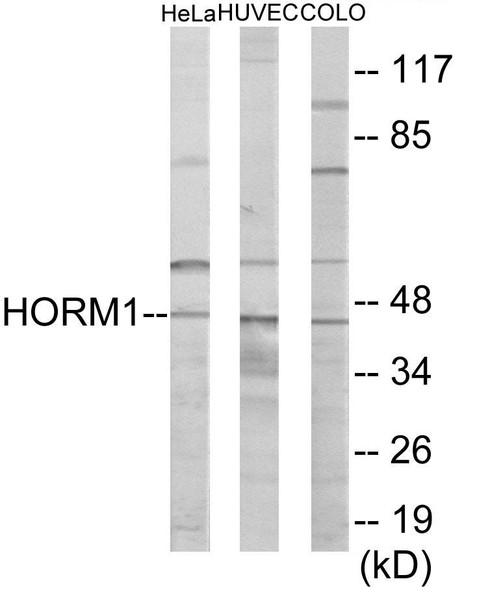Description
| Antibody Name: | HORMAD1 Antibody |
| Antibody SKU: | PACO00928 |
| Size: | 50ug |
| Host Species: | Rabbit |
| Tested Applications: | ELISA, WB |
| Recommended Dilutions: | WB:1:500-1:2000 |
| Species Reactivity: | Human |
| Immunogen: | synthesized peptide derived from the C-terminal region of human HORMAD1. |
| Form: | Liquid |
| Storage Buffer: | Liquid in PBS containing 50% glycerol, 0.5% BSA and 0.02% sodium azide. |
| Purification Method: | The antibody was affinity-purified from rabbit antiserum by affinity-chromatography using epitope-specific immunogen. |
| Clonality: | Polyclonal |
| Isotype: | IgG |
| Conjugate: | Non-conjugated |
| Synonyms: | HORMAD1; NOHMA; HORMA domain-containing protein 1; Cancer/testis antigen 46; CT46; Newborn ovary HORMA protein |
| UniProt Protein Function: | HORMAD1: Plays a key role in meiotic progression. Regulates 3 different functions during meiosis: ensures that sufficient numbers of processed DNA double-strand breaks (DSBs) are available for successful homology search by increasing the steady-state numbers of single-stranded DSB ends. Promotes synaptonemal-complex formation independently of its role in homology search. Plays a key role in the male mid-pachytene checkpoint and the female meiotic prophase checkpoint: required for efficient build-up of ATR activity on unsynapsed chromosome regions, a process believed to form the basis of meiotic silencing of unsynapsed chromatin (MSUC) and meiotic prophase quality control in both sexes. 5 isoforms of the human protein are produced by alternative splicing. |
| UniProt Protein Details: | Protein type:Cancer Testis Antigen (CTA) Chromosomal Location of Human Ortholog: 1q21.3 Cellular Component: chromosome; nucleus Biological Process: blastocyst development; meiosis; meiotic DNA double-strand break formation; meiotic recombination checkpoint; meiotic sister chromatid cohesion; oogenesis; spermatogenesis; synaptonemal complex assembly |
| NCBI Summary: | This gene encodes a HORMA domain-containing protein. HORMA domains are involved in chromatin binding and play a role in cell cycle regulation. The encoded protein may play a role in meiosis, and expression of this gene is a potential marker for cancer. A pseudogene of this gene is located on the long arm of chromosome 6. Alternatively spliced transcript variants encoding multiple isoforms have been observed for this gene. [provided by RefSeq, Dec 2010] |
| UniProt Code: | Q86X24 |
| NCBI GenInfo Identifier: | 74750516 |
| NCBI Gene ID: | 84072 |
| NCBI Accession: | Q86X24.1 |
| UniProt Secondary Accession: | Q86X24,Q4G114, Q5T5I3, Q5T5I4, Q5T5I5, Q6FIC1, Q9H0K8 A6NMK2, B3KUK1, |
| UniProt Related Accession: | Q86X24 |
| Molecular Weight: | 36,676 Da |
| NCBI Full Name: | HORMA domain-containing protein 1 |
| NCBI Synonym Full Names: | HORMA domain containing 1 |
| NCBI Official Symbol: | HORMAD1 |
| NCBI Official Synonym Symbols: | CT46; NOHMA |
| NCBI Protein Information: | HORMA domain-containing protein 1 |
| UniProt Protein Name: | HORMA domain-containing protein 1 |
| UniProt Synonym Protein Names: | Cancer/testis antigen 46; CT46; Newborn ovary HORMA protein |
| Protein Family: | HORMA domain-containing protein |
| UniProt Gene Name: | HORMAD1 |
| UniProt Entry Name: | HORM1_HUMAN |






